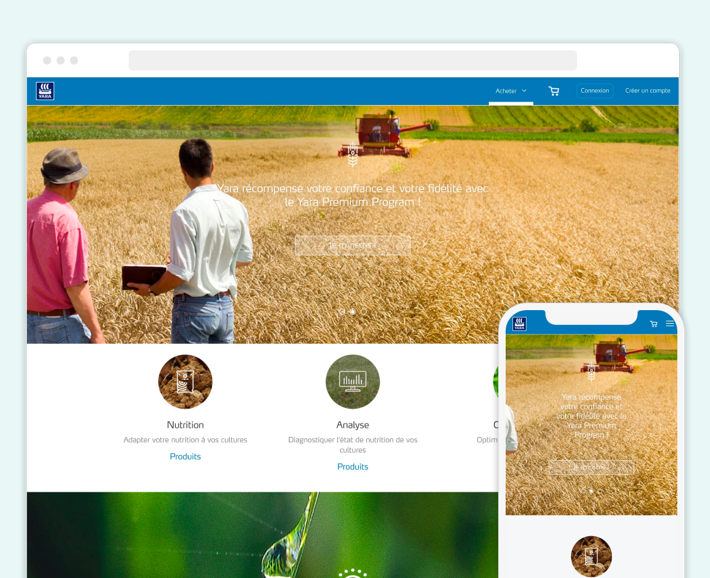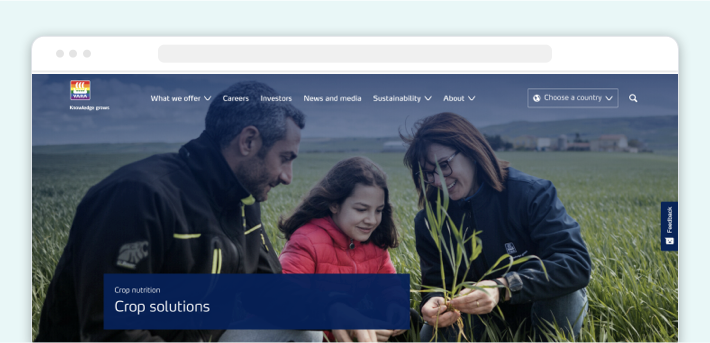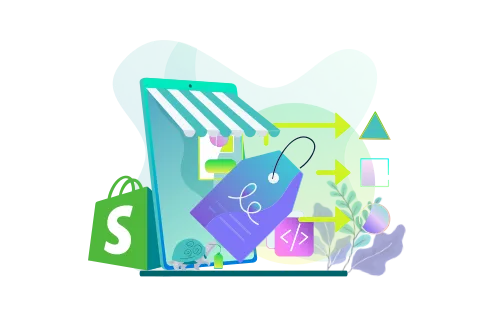Running a growing eCommerce business can be fantastic, but managing separate systems for inventory, fulfillment, sales, and more can quickly become a concern. Before process inconsistencies lead to frustrated customers and wasted time, consider Shopify ERP integration as a solution.
Integrating ERP with Shopify means connecting your online store with an Enterprise Resource Planning system to make your operations smoother. Think of ERP as a central source of truth that combines everything — supply chain, finances, manufacturing, you name it.
In this article, we’ll explain how Shopify ERP integration works and what benefits it brings. Having connected Shopify stores with ERPs, as we did for Yara International, we’re ready to share insights from our experience.

Benefits of Shopify ERP Integration
Imagine you don’t have to manually supervise and update every part of your operations. That’s what you get with ERP. Let’s look at the other benefits of ERP integration with the Shopify platform:
Modern Sales System
Shopify is a powerful tool with robust features that simplify online selling. Integrating it with ERP lets you handle communication with customers and fulfill orders easily. You can reach accurate inventory data in real time to ensure the necessary products are available. You can send order status updates automatically, so your customers enjoy a seamless shopping experience.
Central Data Hub
One of the biggest headaches you may have as your business grows is data spread across different platforms. The benefits of Shopify integration with ERP comprise removing these data silos and keeping all information in one central location. This includes:
- Customer details
- Order history
- Inventory levels
- Financial data
- Product and pricing data
- Shipping info
ERP integration offers more than just unified data storage. It ensures there are no duplicates or inaccuracies and provides your teams — whether in sales or marketing departments — with up-to-date information. This ultimately leads to better data analysis and more confident decisions.
Automated Processes
Manual data entry is time-consuming and subject to human error. Shopify ERP integration tackles that by automating various processes, like:
- Inventory updates. Real-time stock level synchronization between Shopify and your ERP means accurate product availability.
- Inventory replenishment. Define stock levels for your products, and ERP will automatically trigger purchase orders when inventory drops below a certain threshold.
- Order fulfillment. Orders placed on your Shopify store automatically initiate fulfillment workflows in your ERP, covering picking, packing, and shipping processes.
- Order updates. Order information from your store syncs with ERP; you don’t need to manually enter it.
- Customer invoicing. Invoices can be automatically generated and sent to customers after order confirmation — saving you valuable time.
Learn how you can reach these benefits with GenovaWebArt. Just drop us a line and get a quick consultation!
Improved Customer Experiences
Other benefits of Shopify Enterprise Resource Planning (ERP) integration include delivering a better experience to your customers. This is a top priority for 75% of enterprise companies surveyed by Shopify.

Here’s how integration helps:
- Omnichannel experiences. Synchronizing data across various sales channels and touchpoints ensures uninterrupted shopping for your customers, wherever they interact with your brand.
- Improved order tracking. Customers can easily track their orders in real-time, owing to synced data between your store and ERP.
- Faster order fulfillment. Automated processes within your Shopify store and ERP help speed up order processing and fulfillment.
- Accurate orders. Automation reduces human errors and makes sure customers receive the correct items they ordered.
How Shopify ERP Integration Works
Understanding how Shopify ERP works is straightforward — you connect your store with your enterprise resource planning system. This can be done in two ways:
Pre-Built Integrations
Shopify’s app store is packed with various solutions, and ready-made integrations for popular ERP systems are no exception. These applications are often developed by the ERP vendors themselves or 3rd party integration services providers.
In particular, Shopify connects with the following ERP software:
- NetSuite
- Microsoft
- Acumatic
- Brightpearl
This approach to Shopify ERP integration is beneficial, as pre-built solutions are typically user-friendly and need minimal technical expertise to set up. They also come with a core set of functionalities necessary to automate key workflows.
Custom Integrations
Although pre-built integrations are convenient, they may not always fully satisfy your business needs. In such cases, custom integration is the way to go. Here’s when custom Shopify solutions are especially helpful:
- Unique business processes. If your business requires specialized functionality for distinctive workflows, a bespoke integration can follow your requirements.
- Legacy ERP systems. If you’re already using an outdated ERP that doesn’t have the necessary features or doesn’t integrate with Shopify, custom development can tackle that.
While implementing this approach requires more time and costs, it ensures you get the best possible solution for your company’s needs. Reliable Shopify developers like GenovaWebArt can consult you on a suitable integration method and help you with implementation.
Shopify ERP Integration Challenges
You’ve seen that combining ERP and Shopify is highly beneficial. Yet, there are potential concerns to be aware of. Let’s consider the main Shopify ERP integration challenges so you can prepare for them beforehand.
Budgetary Concerns
ERP integration projects can involve various expenses, including software licenses, developer fees, and ongoing maintenance. If not planned properly, implementation may cost you way more money than you expected.
Define your integration goals and required features clearly to ensure you’re paying for the right solution. Besides that, keep in mind that initial costs may seem significant at first, but they’re an investment in your organization’s long-term growth.
Data Security Risks
Other Shopify ERP integration risks include data security. Your online store and ERP system hold a lot of business-critical information — think customer details or financial statements. You may have to deal with costly data breaches, cyberattacks, and reputational damage if it’s not protected enough.
To avoid these risks, choose reliable integration solutions and developers who put data security first. Encryption, two-factor authentication, and access controls are several ways to protect your company’s information.
Integration Complexity
Shopify ERP integration can come with various complexities that require careful planning and execution. Here are some common challenges:
- Internal resistance. Introducing new systems can sometimes cause inconvenience and even resistance from your staff. Tackle this issue by communicating the benefits of this process and providing relevant training.
- Software integration complexity. When connecting the two systems, you may face compatibility issues. However, working with experienced developers who understand Shopify and your specific ERP can help.
- Poor data quality. Inaccurate, incomplete, or duplicate data in either Shopify or ERP may cause integration problems. Handling data cleansing with professional experts can improve your project’s success significantly.
Real-World Examples of Successful Shopify ERP Integrations
Get inspired by the businesses that achieved remarkable results through Shopify ERP integration. Here are several success stories:
Bauer
This famous hockey equipment brand started improving operations by moving from Salesforce to Shopify Plus. Subsequently, the company chose SAP as its ERP system for order management. As a result, Bauer improved the shopping experience for its customers and witnessed a 60% increase in revenue.
RUDIS
The popular athletic apparel brand, RUDIS, has outgrown its eCommerce platform, WooCommerce, and decided to migrate to Shopify Plus. Once they reached the advanced functionalities offered by Shopify, they leveraged NetSuite ERP to achieve even greater efficiency. This led to business expansion and an 80% boost in revenue.
Grow your business like RUDIS. Get an audit of your existing solution to see how Shopify ERP integration can help you achieve similar results.
Transformer Table
Once the furniture brand Transformer Table moved to Shopify Plus from Wix, it decided to proceed with its growth. To make its operations more efficient, it chose NetSuite ERP as a solution. This integration helped it streamline inventory management, order fulfillment, and accounting and scale to over $100 million in annual sales.
Nanoleaf
This leading smart lighting company upgraded from Shopify to Shopify Plus to scale globally. They also used Shopify Flow to automate their marketing processes and easily promote their products worldwide. On top of that, Nanoleaf used Microsoft ERP, Shopify’s partner, to improve data management across multiple sales channels, enabling them to deliver products to customers 25% faster.
Molekule
The air purifier manufacturer, Molekule, switched from expensive and resource-intensive Adobe Commerce to Shopify Plus. They aimed to grow conversions and subscription revenues owing to Shopify’s robust sales and marketing features. They also decided to use NetSuite ERP software to optimize inventory management and sales. As a result, the brand increased conversions by 75% and boosted subscription income by 7%.
How GenovaWebArt Can Help with Shopify ERP Integration
GenovaWebArt has been assisting Shopify stores in their growth since 2012. With this significant experience, we know everything about the challenges and opportunities that Shopify ERP integration offers. Here’s how we can support you:
- Shopify ERP integration. From custom integrations to pre-built solutions — we handle it all.
- API and third-party app integration. Streamline your inventory, marketing, and other processes with our help. Check our latest post on the Yotpo app and Shopify integration to see our expertise in action.
Let’s now talk practical. Our team has profound experience integrating Shopify with various ERP systems, including industry leaders like SAP. For Yara International, we successfully connected their Shopify Plus store with their SAP system. Given that our client aimed to expand to new markets, this integration helped streamline product management and order fulfillment.

Of course, not all businesses fit into ready-made integrations like SAP. That’s why we’ve integrated many custom ERPs for our other clients. Our solutions helped to deliver advanced functionalities necessary for non-typical business processes.
Besides pre-built and custom ERPs, we’ve developed bespoke apps that substitute some features of traditional enterprise resource planning systems. For one of our clients in food delivery, we delivered an application that automatically generated a shopping list with the exact ingredients and quantities needed for meal preparation. This was a convenient solution for consumers and an efficient tool for our client.
You can learn more about our experience in ERP integrations and Shopify development in general in our portfolio.
Conclusion
Integrating ERP with Shopify is a way to combine siloed data in one place and automate various aspects of your eCommerce business. As you’ve seen from the real-world examples described above, the opportunities are significant.
The benefits of ERP integration with Shopify platform are almost limitless — consider modern sales features, centralized data, streamlined operations, and, ultimately, better customer experiences.
Want to boost your sales and optimize processes with ERP integration? GenovaWebArt can assist you in this venture. Our experienced team has helped over 200 Shopify businesses succeed, and we’re here to support you as well. Feel free to contact us anytime to discuss which Shopify ERP integration solution is best for you.
Frequently Asked Questions
How can integrating ERP with Shopify benefit my eCommerce business from a sales perspective?
- Improved inventory management. Real-time inventory visibility ensures you never oversell or understock products.
- Efficient order fulfillment. Workflow automation lets you speed up order processing and delivery, encouraging customers to buy from you again.
- Improved order accuracy. Less to no manual data entry reduces errors and makes sure your customers get exactly what they ordered.
- Better customer service. Centralized data lets you provide faster and more personalized responses and offers to your customers.
How long does it take to integrate ERP with Shopify?
- Simple integrations. Integrating a few features can be completed relatively quickly, up to a month.
- Complex integrations. Developing a custom integration with advanced functionalities may take longer, potentially up to six months.
Can Shopify ERP integration help me expand my sales channels or enter new markets?
Can Shopify ERP integration help me improve my marketing?
- Customer segmentation. You can use customer data from your ERP and online store to understand your customer base and segment them effectively.
- Targeted promotions. Access to real-time sales data from your ERP lets you identify slow-moving products and promote them to boost sales.
- Inventory-based marketing. When you integrate ERP with Shopify, you know exactly how many and which products you’ve got. Owing to this, you can promote in-stock items and avoid advertising those that are out of stock.
![Shopify ERP Integration: Pros & Flow [2024] - GenovaWebArt blog article, banner image Shopify ERP Integration: Pros & Flow [2024] - GenovaWebArt blog article, banner image](https://genovawebart.com/hubfs/img/webp/hero-banner-blog-article-shopify-erp-integration.webp)





